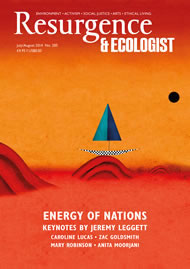This is one of the most thrilling books I have read in a long time. Within it are the seeds of the religions of the future, a manifesto for the Earth, and a vision of humanity that is timely, renewed and, above all, alive with love.
The evolution of this book has taken thousands of years. It will take time for the political establishments to know and feel this book, but as the years go by it will be seen as seminal. The words within it set in stone the reality that environmental consciousness is rooted in experiencing the natural world, the planet that sustains life, and the universe as intrinsically holy and sacred. And whilst the contributors to this anthology express that sense of the sacred, the numinous from within the imprint of their own traditions, what becomes powerfully apparent is that no one religious tradition has something more important to say than any other and that taken together each enlivens the others. But most of all, this book challenges the two most powerful assumptions that have brought into being the world we now know, and looks beyond the carrion on which we feed.
The first of these assumptions is that science, facts, figures, graphs and computer models are the ropes that will rescue us from our own indifference. In the middle of the last century, Audrey Geraldine Lorde wrote: “The master’s tools will never dismantle the master’s house.” Much of what is written in Spiritual Ecology gently and powerfully reveals that all the environmental campaigns built using those tools can only ever achieve very limited results; and from between the lines emerges the stark reality that environmental NGOs have been compromised and contained by the very power structures they seek to inform.
The chapters written by John Stanley and David Loy, Winona LaDuke and Satish Kumar speak eloquently of the illusion of soil existing without soul and of the arid indifference that has infected the governance of the planet. I can quite understand why those who sounded the alarm on behalf of the natural world should feel a great deal of suspicion and antipathy towards a primarily religious identity and, for very understandable reasons, should wholly sympathise with Lynn White’s observations that particularly those who followed the Abrahamic monotheistic traditions viewed the Earth as “a resource for human consumption”, and that the current models of decimation have been licensed by and have their roots in medieval Christianity.
Spiritual Ecology at last moves the stylus that has been stuck in that groove for the last 50 years: not in the fact that it denies the veracity of White’s convictions, but rather that the contributions from Thomas Berry, Sister Miriam MacGillis, Joanna Macy and Bill Plotkin acknowledge and celebrate the fact that more than anything else it is our view of the sacred that informs our identity and our understanding of progress.
What I love about this book is that it is written in clear prose. That it is both prophetic and erudite and hasn’t been estranged by the use of academic theological language. That it has been able to water equally both my neo-Darwinian and my religiously minded friends, some of whom read it through the night in one sitting. Yes, it is that gripping. They all agree that the main contribution of this book is that it irrefutably cremates the coffin of self-centred salvation and uses the ashes to replenish the Earth. It is the assumptions of self-centred salvation promoted and ritualised by the Judaeo-Christian traditions for well over a thousand years that, as White understood, lie at the root of the current ecological crisis. Up until now the antidotes for it have been hard to find, hard to know.
In the penultimate chapter of Spiritual Ecology, Father Richard Rohr lambasts his and my spiritual tradition for its congenital myopia. Preceding that is some wonderful writing from Thich Nhat Hanh, Chief Oren Lyons, Jules Cashford and Sandra Ingerman, who illuminate the reality of a giving and connectedness between all life, and the insufficiency and the legacy of the biological understanding of a system based solely on the dark reality of the “survival of the fittest”.
It is now becoming clear that the notions of a self-centred salvation and the imperatives of the survival of the fittest have risen from the same grave. More than anything, Spiritual Ecology lays them to rest and offers a vision of new humanity imbued with and celebrating a sacredness that is the common inheritance of the universe, of which along with all life we are equal inheritors. When it is my turn to die, I can do so a little happier knowing that this book is in print.







